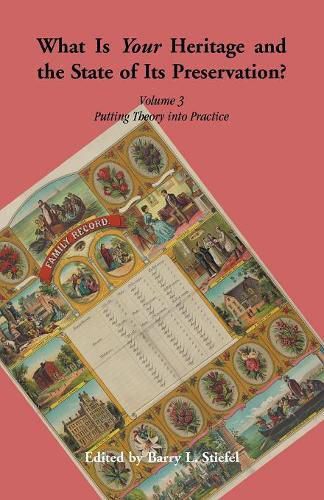Readings Newsletter
Become a Readings Member to make your shopping experience even easier.
Sign in or sign up for free!
You’re not far away from qualifying for FREE standard shipping within Australia
You’ve qualified for FREE standard shipping within Australia
The cart is loading…






This title is printed to order. This book may have been self-published. If so, we cannot guarantee the quality of the content. In the main most books will have gone through the editing process however some may not. We therefore suggest that you be aware of this before ordering this book. If in doubt check either the author or publisher’s details as we are unable to accept any returns unless they are faulty. Please contact us if you have any questions.
During the Spring 2018 semester several students at the College of Charleston’s Historic Preservation and Community Planning program participated in their Senior Seminar titled What Is Your Heritage and the State of Its Preservation? This was the third time this seminar topic had been taught, with the first in 2014 and the second in 2016. For this class each student had to conduct a lengthy, in-depth research paper on the state of preservation of heritage sites, material objects, or traditions associated with their family’s history. The assignment used genealogical research methods in an unconventional way by elevating the assessment of ancestors beyond typical names, dates, and generational succession so commonly found on most family trees. The students had to ask profound questions to guide their inquiry, such as Where (as in a specific spot) did my ancestors come from? ; What was life like for them? ; and What cultural traditions were important for them? . In this way people, whether through a specific individual or a group, became connected and contextualized within time, place, and society. Moreover, the students had to utilize and synthesize the knowledge, skills, and experiences they acquired in other classes from past semesters. Essays contributed within this volume are by Rebecca Lawing, Flannery Wood, Ellen Feringa, Madison Alspector, Madison Moga, and Alec Meier.
Barry L. Stiefel, Ph.D. is an associate professor in the Historic Preservation and Community Planning Program at the College of Charleston, where he enjoys collaborating on projects with students.
$9.00 standard shipping within Australia
FREE standard shipping within Australia for orders over $100.00
Express & International shipping calculated at checkout
This title is printed to order. This book may have been self-published. If so, we cannot guarantee the quality of the content. In the main most books will have gone through the editing process however some may not. We therefore suggest that you be aware of this before ordering this book. If in doubt check either the author or publisher’s details as we are unable to accept any returns unless they are faulty. Please contact us if you have any questions.
During the Spring 2018 semester several students at the College of Charleston’s Historic Preservation and Community Planning program participated in their Senior Seminar titled What Is Your Heritage and the State of Its Preservation? This was the third time this seminar topic had been taught, with the first in 2014 and the second in 2016. For this class each student had to conduct a lengthy, in-depth research paper on the state of preservation of heritage sites, material objects, or traditions associated with their family’s history. The assignment used genealogical research methods in an unconventional way by elevating the assessment of ancestors beyond typical names, dates, and generational succession so commonly found on most family trees. The students had to ask profound questions to guide their inquiry, such as Where (as in a specific spot) did my ancestors come from? ; What was life like for them? ; and What cultural traditions were important for them? . In this way people, whether through a specific individual or a group, became connected and contextualized within time, place, and society. Moreover, the students had to utilize and synthesize the knowledge, skills, and experiences they acquired in other classes from past semesters. Essays contributed within this volume are by Rebecca Lawing, Flannery Wood, Ellen Feringa, Madison Alspector, Madison Moga, and Alec Meier.
Barry L. Stiefel, Ph.D. is an associate professor in the Historic Preservation and Community Planning Program at the College of Charleston, where he enjoys collaborating on projects with students.